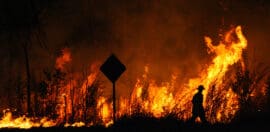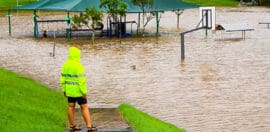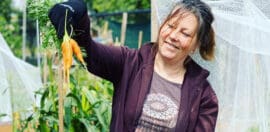Government seeking collaboration to stop environmental decline

Picture: Jo-Anne McArthur on Unsplash
19 July 2022 at 6:15 pm
Australia’s environment is sick and getting worse, but the government is flagging a desire to work with the sector to address the mess.
The federal government has left the door open on partnering with the philanthropic sector and businesses to address the declining state of Australia’s environment.
In a speech to the National Press Club on Tuesday, Environment Minister Tanya Plibersek said the government would “need to work with industry and with philanthropic partners” on projects to protect and restore Australia’s environment, in the wake of the release of the shocking State of the Environment report.
“The scale of this challenge means that governments can’t do it alone,” Plibersek said, adding that many philanthropic organisations and businesses were “already doing terrific work”.
The minister said she was “excited” at the prospects of working with these sectors and said she already had some areas to look into, including supporting investment in low-carbon projects.
Plibersek’s comments followed the release of a damning new report into Australia’s environment.
The horrifying reality of Australia’s environment
The State of the Environment Report 2021 was publicly released on Tuesday. It was first presented to former environment minister Sussan Ley towards the end of 2021.
The report was not actioned or released during this time.
“For six months [the report] sat on the previous minister’s desk,” Plibersek told the National Press Club.
Plibersek said it was “confronting” but that Australians “deserve” to know the truth of the state of our natural world.
Australia’s environment is described as “poor and deteriorating” in the report, with factors like climate change, habitat loss, invasive species, pollution and resource extraction placing pressure on species and ecosystems.
The number of threatened species listed in Australia rose by an average of eight per cent over the past five years – higher for frogs and invertebrates, at 21 and 22 per cent respectively.
The impacts of climate change are already being felt, with the country experiencing higher temperatures, increased extreme bushfire weather and changes in rainfall, according to the report.
“The Australian climate has warmed by a mean of 1.4°C on land and 1.1°C in the oceans since consistent national records began,” the report noted.
In terms of biodiversity, Australia has one of the highest rates of species decline among OECD countries and has lost more mammal species over the past two centuries than any other continent. Climate change has become a driver of habitat change and species loss.
Humans are feeling the effects of the sick environment in the same way as our flora and fauna. Climate change, along with urban sprawl, are “putting increasing pressure on fresh food provision and security”, the report states.
Agriculture is putting pressure on the environment through things like water use for irrigation, and land-clearing. In our oceans, bottom-trawling is impacting sensitive marine habitats, and inner-shelf reef species are in decline.
Meanwhile, poor air quality is affecting the health of Indigenous communities. Development and non-Indigenous land management are placing pressure on Indigenous landscapes and heritage, and the report noted that “major changes” were needed to First Nations governance and heritage legislation to allow better access to, and caring for, Country.
Government clings to existing target
Despite the grim outlook of the report, Plibersek used her National Press Club address to double down on Labor’s stated 43 per cent emissions reduction target, saying the government would not deviate from what it had taken to the election.
She also refused to rule out new coal and gas projects.
Going forward, Plibersek told the audience that she would be guided by three principles: to protect, to restore, and to manage Australia’s environment.
In this term of government I will be guided by three essential goals: to protect, to restore, and to manage Australia’s environment.
— Tanya Plibersek (@tanya_plibersek) July 19, 2022
Environment sector reacts to the report
WWF-Australia called for the report to be a “turning point that leads to greater investment and stronger laws to protect Australia’s wildlife and wild places”.
“The findings of this report are heartbreaking, and the leadership failures that have led to loss at this scale devastating,” said WWF-Australia’s acting CEO, Rachel Lowry.
She called for the government to put resources behind saving threatened species like koalas and the greater glider.
⚠️The State of the Environment Report tells a story of decline and neglect, concluding the state of Australia’s environment is poor and deteriorating as a result of increasing pressures from climate change, habitat loss, invasive species, pollution & resource extraction. (thread) pic.twitter.com/5KlWQnzyHv
— WWF_Australia (@WWF_Australia) July 19, 2022
Extinction Rebellion’s Victoria spokesperson Miriam Robinson said there was “no more time to play political games”.
“As the climate becomes more unstable, we need to do everything we can to preserve what we still have left, while we still can,” she said.
Kelly O’Shanassy, chief executive officer of the Australian Conservation Foundation, said “nature is under pressure like never before”.
“To halt Australia’s nature crisis we need strong national environment laws, an independent regulator to enforce them and adequate funding for the recovery of Australia’s threatened species and the restoration of degraded landscapes,” she said.
“First Nations people have been caring for Country for tens of thousands of years. This report confirms our environment is poorer because of the lack of Indigenous leadership, knowledge and management. We should prioritise Indigenous-led solutions to this crisis.”
The Responsible Investment Association Australasia (RIAA) said the report “should raise alarm bells to the Australian business and finance sectors”.
“The health of Australia’s natural environment is becoming a material financial risk and proxy for the state of our economy, given the significant interdependencies between the two: from agricultural industries to resources, from tourism to property, right through to financing and insurance,” the organisation said in a statement.
Estelle Parker, executive manager of programs at the RIAA, said it was time to “understand nature as an important asset upon which our economy is built and depends, alongside human, financial and manufactured capital which are already valued”.
She said environmental decline is driving investment decisions around the world.
“Investors want to see the new government strengthen and improve the health indicators of this critical national asset, and that our response must seek to be informed and in close partnership with First Australians,” she added.







